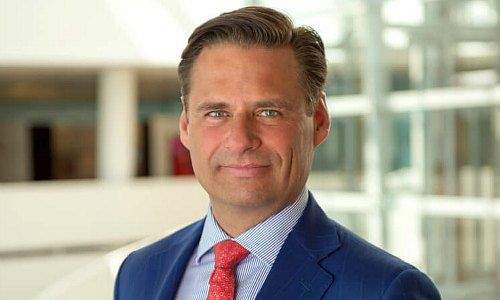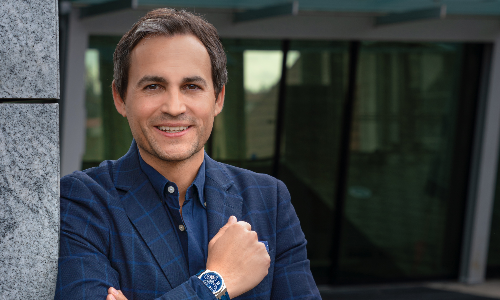Banking is about to undergo sweeping cultural and structural change that will lead to cooperation agreements covering specific segments of the industry's activities, Kim Fournais, the CEO of Saxo Bank, told finews.asia in an interview.
Mister Fournais, what brings you, the CEO of a commercial bank, to Web Summit?
Technology is getting increasingly more important for the finance industry. For Saxo, it is essential of course: we started developing banking technology for the web in the mid-1990s already. We consider ourselves as fintech before that word was even used. For us, Web Summit is a natural place to be.
In the end, it is all about democratizing investment and trading and therefore we created an easy, cheap and transparent access to financial markets on a global level.
What we see today is a traditional banking system, be it globally or in Switzerland, with a very traditional business model and a very traditional IT infrastructure – the mainframe systems that all the banks are using.
According to a recent survey, banks are spending 85 percent of their IT resources on maintaining those systems and on coping with regulatory demands. So there is very little left for client experience and for improving the business model.
«Partnerships will be the next big disruptor»
At Saxo, we started on a shoestring in 1992 and since the mid-90s we've been focusing on technology and on how to democratize investment and trading, obviously using the Internet.
There are a lot of paradigm shifts in the world and everybody constantly has to rethink business models and strategy and focus on how you can better provide unique services to your clients. Technology is a cornerstone of that. At Saxo we also believe partnerships will be the next big disruptor, because it is apparent to everybody that you can't do everything for everyone.
That's also a reason why it is good to be at Web Summit, because there are a lot of tech-savvy individuals here and I do believe that partnerships between traditional banks and fintechs and facilitators like us will be much more dominant in the years to come.
You are one of the very earliest fintech or digital banker, starting your business in 1992. A quarter of a century later, with now 1,500 employees, did the bank develop as you hoped it would and planned for or has it become something entirely different altogether?
We always had a strong vision of being a facilitator, trying to democratize investment and trading. We focused on adding multiple asset classes, and today we are the only bank in the world to offer a true multi-asset trading facility in 28 languages, built on open API. When we started developing the tools and services for the Internet, we had this vision of making it much easier and transparent for normal people to trade and invest across the world. There have been lots of bumps along the road and it hasn't necessarily been an easy ride, but we stuck to our vision.
It is difficult to predict things such as Facebook or Google. For us it was simply important to provide a unique access to private individuals and now to financial institutions. A quarter of a century back, there were no smartphones, so we wanted to give access to the global markets using personal computer in any language of choice and in any currency denomination.
What should governments do to enable startups to thrive?
When you look at fintechs in general, they are typically very savvy on user interfaces and on digital distribution. But being a regular financial institution, running a bank in many jurisdictions today is highly complex. With the whole regulatory framework and the risks involved, it is very difficult to start up. If we had started our bank today, it would have been extremely difficult. Back then, if you had a program and a telephone, you could start your business. It is therefore super important that you can create partnerships and that you allow those partnerships to thrive.
«The transformation we see in the market today is the need to partner up»
When it comes to regulators and politicians, it is important that they don't throw out the baby with the bathwater with all the regulation. It is about creating clear rules, but not too many of them. Today, there are too many. Everyone agrees that banks should be well capitalized and that you have to know where your client is coming from. But if you make it so difficult that not many institutions are left, you are not creating the competition that you need to create better products and services for the clients. So it's a balancing act of creating an even platform for people to build their businesses but also not make it so complex that no one can enter the frame.
Where do you earn your money? Is it with licensing fees or trading commissions?
We earn money as a bank. We don't have licensing fees. We try to create win-win agreements with our partners. For instance in white labeling, which is a very important part of our business, the pipeline looks very promising, because everyone realizes now that they need to unbundle instead of doing everything themselves.
That means we typically have a revenue-sharing agreement with the partners we work with – the more they do with us, the cheaper they get the full service, because the more they do, the more we get the operational leverage. Servicing a small partner and a big partner is not that much different so they get the benefit of the scale. We get access to the client franchise and they get the full technological infrastructure.
Aren't there other companies offering this type of service?
We are the only bank in the world providing the full multi-asset global access. This is about giving an efficient platform to self-directed investors and to delegators who want to know what they should do with their money. They don't get our products, because we don't have any, but they can choose products from any other provider via our platform.
That's a different way to how banks traditionally are doing it, because they are geared towards a manual access to their clients and not towards a digital way. I believe that relationships with people will remain important, but it has to be better supported by technology.
Where do you see the big banks going in future?
They will also have to go in this direction, providing much better digital support throughout the value chain. They will obviously continue to rely on relationship management. But it is also clear that this is an industry in risk of disruption.
«Of course there are very good mutual funds, but there are also a lot that are not fantastic»
If you look at mutual funds: of course there are very good mutual funds, but there are also a lot that are not fantastic, they are typically quite expensive compared to ETFs. In the U.S., some 40 percent of investors' funds are in ETFs today. For Denmark the corresponding figure is only 1.5 percent. So there's still some way to go. Right now, the banks are not overly motivated to sell ETFs, because they are much cheaper and more transparent and prevents them from selling their mutual funds.
So, in this process, there will be fast movers, who will come out with a very digital, very transparent fast offering and then there will be some, who will be delayed.
For a few decades in Switzerland banking was the biggest industry. Now, the young people don't want to go into banking anymore. Do you have an explanation for this?
It has to do with the lower prestige. The governments have poured loads of money into supporting the banks and that has lowered their reputation. And the bonus payments are not exactly the same anymore.
«We are at a Blockbuster-Netflix moment»
Everyone knows that a transformation needs to take place. It's a technological transformation, but also a cultural transformation. And it is also a business model transformation. Potentially, we are at a Blockbuster-Netflix moment, because people will be able to get their banking services in a very easy, seamless and transparent way. It takes time, because people are much more loyal to their bank than to their spouse. As long as it's like that, change will happen slowly. But there will be great opportunities for everyone in this environment of change, once it starts gathering pace.
Kim Fournais, 50, is co-founder and chief executive officer at Copenhagen-based Saxo Bank. The keen pilot is in charge of a bank that caught the attention in the early 1990s, when it launched a Web-based trading platform aimed at providing investors with a cheap and transparent trading platform. Today he holds a quarter of the bank's shares. He answered the questions of finews.asia at the Web Summit in Lisbon last week, the largest gathering of fintech entrepreneurs.




















